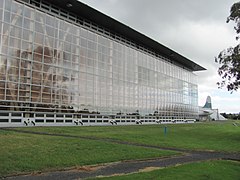Motat
| Museum of Transport and Technology | |
|---|---|

An exhibition hall in MOTAT 2
|
|
| General information | |
| Type | Museum |
| Location | Auckland, New Zealand |
| Address | Western Springs |
| Inaugurated | 1964 |
| Website | |
| http://www.motat.org.nz/ | |
The Museum of Transport and Technology (MOTAT) is a science and technology museum located in Western Springs, Auckland, New Zealand. It is located close to the Western Springs Stadium, Auckland Zoo and the Western Springs Park. The museum has large collections of civilian and military aircraft and other land transport vehicles. An ongoing programme is in place to restore and conserve items in the collections. This work is largely managed by volunteers many of whom have been associated with MOTAT for upwards of four decades. Since the passing of the Museum of Transport and Technology Act in 2000, new management and the support of full-time professional museum staff and a large number of dedicated long term volunteers have ensured the Museum's future. New public programmes and facilities now promote the collections.
MOTAT was established in 1960 by a combination of groups including the Old Time Transport Preservation League, which was formed in 1957 and preserved trams and railway locomotives. MOTAT was formally opened in 1964.
MOTAT 1 was built around the site of a beam engine pump house, which originally provided Auckland's water supply (system similar to the Crofton Pumping Station and Markfield Beam Engine). The Council engaged the services of famed engineer, William Errington, to design and construct the Pumphouse and Boiler house to provide the first pressurised water supply to Auckland. Adjacent swampland was excavated creating a 6-foot-deep (1.8 m) dammed lake, which is filled by three natural springs. This area is now the Western Springs Lake and parkland. The engine is a Double Woolf Compound built by John Key and Sons of Kirkcaldy in Scotland, who also built the long scrapped Lancashire boilers that originally provided the steam. The Western Springs Water Works officially opened in a small ceremony on 10 July 1877. The pumphouse was superseded by Auckland's extensive dam system and reticulation in 1928. Restoration and earthquake strengthening of the building was completed in 2002 and overhaul of the long dormant Beam Engine commenced at the start of 2005. On 11 October 2007 the engine moved under pneumatic pressure for the first time in 79 years and was finally tested under steam during the evening of 29 November the same year. The Beam engine was re-commissioned in a special public opening on 19 April 2008. A range of other early steam engines are kept in running order including a 1910 Tangye steam engine, an impressive 1911 triple-expansion engine built by Campbell Calderwood from Paisley, Scotland, which was formerly from the ill-fated Sydney Ferry The Greycliffe which sank on 3 November 1927 after being hit by the much larger Union Steam Ship Company’s Royal Mail Steamship Tahiti with the loss of 40 lives. The engine ended its commercial life in the Tirau dairy factory. Steam for the Beam Engine and other artifacts provided by a 1957 Daniel Adamson steam boiler, which was formerly used at Frankham's Mill, Te Puna.
...
Wikipedia
